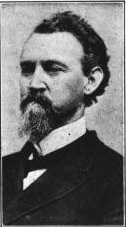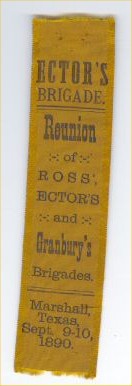Submitted by: Patrick Hogue
Maj. Jonathan D. Rudd
Maj. Jonathan Davenport Rudd, of Mashall, Tex., passed to the great beyond on April 26, 1920. He was among the
last of that splendid manhood which makes every Southerner hold his head erect and be proud of his nativity; one
of those who not only offered his life for his Southland, but who, with no less bravery and ability, builded anew
our civilization on the ruins of the war.
Major Rudd was born in Newberry District, S.C., on February 17, 1840. In 1857 he went to Texas and settled in
Harrison County, about three miles south of Waskom. He was universally known as "Major Rudd," although he was a
colonel on the staffs of both Governors Hogg and Culbertson. As a soldier of the Confederacy he attained the rank
of first lieutenant of Company G, 14th Texas Cavalry, Ector’ Brigade, and served under Generals Johnston, Bragg,
and Hood in the Army of Tennessee. He was severely wounded in the face by a bullet in the battle of Allatoona, Ga.
He made a splendid record as a fearless and efficient soldier and officer. Of the one hundred and forty one in his
company who went into the war from Panola County, he was one of the thirteen who came back.
Perhaps the most useful, as it certainly was the most eventful and stirring, period of Major Rudd's life was that
following the war, the time of reconstruction, which was particularly bitter and tragic for the good citizens of
Harrison County. No man in the county did more than Major Rudd to overthrow the infamous rule that burdened the
people with debt and inflicted upon them in the most humiliating form the curses of misgovernment, official graft,
and corruption. And no man since the overthrow of that infamous regime has done more toward securing for the
people the blessings assured by that victory. His efforts in this direction began in 1873, when Gen. Walter P.
Lane, General Hawthorne, and Major Rudd were appointed as a committee and cleared the way to the polls for the
white voters, is well remembered. Major Rudd was a member of the organization of the citizens' party, the first
meeting of which was called at Marshall, the county seat and which was attended by twenty-nine citizens besides
himself. For the brave and determined stand he took in the defense and protection of the better element of his
race he was more than once threatened, and was frequently in danger of his life. He led a busy, useful life and
served his county in many capacities. He was tax assessor from 1880 to 1882 and from that year until elected to
the legislature in 1890 he served his people almost continuously as a member of the commissioners' court, and did
his share toward putting the county in a healthy financial condition. When first elected to the commissioners'
court in 1878, county script was worth only fifteen cents on the dollar; when he retired from that court, it was
one hundred cents on the dollar. In 1890 he was elected a member of the twenty-second legislature of Texas to
represent his district in the House, and he was re-elected three times. In this position he continued to render
useful service to the public throughout his four terms and acquitted himself well and honorably as a State
Legislator. In waging his battles Major Rudd never occupied an equivocal position or sacrificed principals to
expediency.
Major Rudd was a member of the First Methodist Church of Marshall. He was also a Mason, a Knight Templar, and a
Shriner. In 1865 he married Miss Leonora T. Hill, who was born in South Carolina, but has resided in Harrison
County, Tex., since 1854. She was a brave and noble helpmate for her husband during the troublous Reconstruction
days, and during the following years of peace and happiness she has been the typical matron of the old-fashioned
Southern home. She survives him.
Source: Confederate Veteran Magazine, January 1920, Volume XXVIII No. 1 Page 346 |

